Mengino:Far away from any road, deep in the
highlands, lies the village of Mengino. It's a place where I
was the first tourist to visit. It's not a place one can
easily forget.
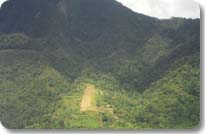
I headed off to the Goroka airport to meet the bush pilot,
Robert. When asked if we were going to fly the twin engine
plane on the tarmac, he replied, “That? We’re landing on the
steepest runway in New Guinea, a 15% grade. We could land in
that but never take off. We’re taking that (single-engine)
plane over there.” The flight was beautiful with endless
sharp ridges covered in green and periodically, a hut would appear in
the middle of nowhere but then it was back to continuous
forest. Robert pointed to a tiny gash in the jungle cover
under the tall walls of an amphitheater of rock. It was hard
to believe that was a landing strip, but it was and he did an excellent
job of bringing us gently down.
We had landed in Maimafu, one of the villages on the trek around Crater
Mountain. There was a French group making a film about tree
kangaroos. They were nice folks and being French, naturally
had good food with them and freely shared it. When told that
I often ate dried spaghetti on the trails, they were amazed. Well,
actually the word “shocked” might be a better description.
They were trying to get out into the bush to film but were having last
minute problems with the village chief trying to wrangle extra money
out of the deal.
 The
next morning I
woke up to the sun just coming over the mountain.
The air was perfectly still with mist rising off the trees and grasses.
What a perfect start to a day. I talked to a guide about
going around the mountain and he brings me to see the chief.
He immediately starts throwing around large numbers and a single fee
becomes two and three fees. A 14 Kina activity (1 Kina = .4
US$) becomes 70 Kina and it just kept going on and on. The
idea of Crater Mountain was that everything is a fixed price so you
don’t have these hassles. He offered me some food, but
declined not knowing if any strings were attached. It went on
like this the next day and a half. When I took a walk to a
waterfall, the people were great but as soon as the chief got involved,
it became very unpleasant. I couldn’t walk around the
mountain and had to stay put seeing that:
The
next morning I
woke up to the sun just coming over the mountain.
The air was perfectly still with mist rising off the trees and grasses.
What a perfect start to a day. I talked to a guide about
going around the mountain and he brings me to see the chief.
He immediately starts throwing around large numbers and a single fee
becomes two and three fees. A 14 Kina activity (1 Kina = .4
US$) becomes 70 Kina and it just kept going on and on. The
idea of Crater Mountain was that everything is a fixed price so you
don’t have these hassles. He offered me some food, but
declined not knowing if any strings were attached. It went on
like this the next day and a half. When I took a walk to a
waterfall, the people were great but as soon as the chief got involved,
it became very unpleasant. I couldn’t walk around the
mountain and had to stay put seeing that:
1) The next village will beat up the
Maimafu guides as they don’t get along
2)It’s Sabbath day
3)Their feet hurt (one look at their
feet of iron and you’ll know this is bull)
I finally convinced them to bring me to Mengino, the closest village
five hours away but the chief will only “allow” me to go there for one
day. I’m extremely uncomfortable being stuck somewhere
without having the power to do anything about it. I tell the
chief, “I’m going to Mengino tomorrow and returning when I feel like
it. You can make guiding fees or I will say in a local’s hut
until the plane returns and you will make nothing. It’s up to
you.”
The next day a guide brought me to Mengino, a village of 100-150
people. We walked about five hours through the jungle along a
track worn smooth by age old footsteps. I arrived in the
village and some kids flocked towards me and others ran away. This
white man was immediately the center of attention of the entire
village. I went for water and a dozen kids watched in rapt
attention, completely dedicated to watching the task.
Returning to my hut to lie down, there were people watching me through
the doorway and kids peering at me from cracks between the
boards. The hut was a traditional building made
from all bush materials using a machete, tied together with vines,
topped off by a thatched roof. I lay down in the smoky hut
and looked around and thought, “Good heavens, this is a long way from
home.”
Nimson, the chief, stopped by. He said, “You’re the first
tourist to ever visit our village. Did you notice that some
of the kids ran away from you? That’s because they’ve never
seen a white person before.” I replied, “At home the kids
also run away from me, but that’s because their mothers warn them about
me.” He laughed and when asked if I really was the first one,
he said I was. He brought me to the center of the village and
everyone gathered around.
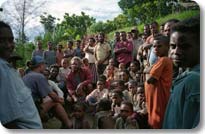 They
would ask me
questions like, “tell us about New York,” or “What is
Australia like?” They would listen to my every word, every
eye focused on me. Only a few could speak English but there
was one guy who reacted to everything I said. Every funny
word or gesture made him laugh and he was wide-eyed at every
story. But for the most part, Nimson was
translating. A skyscraper was initially described as, “The
cities have buildings made of stone and steel that are 400 meters
tall.” When Nimson translated, he went on and on and pointed
to the mountains nearby. Then I realized that for someone who
lived in houses made entirely from bush materials, he had to put it in
terms they could understand. How do you explain a subway to
someone who has never seen a train? Yet based on their
reactions, somehow Nimson managed to get it across to them.
The nearest road to Mengino is 90 difficult km. away and I was told
that for people deep in the bush, they’ve seen more airplanes than cars.
They
would ask me
questions like, “tell us about New York,” or “What is
Australia like?” They would listen to my every word, every
eye focused on me. Only a few could speak English but there
was one guy who reacted to everything I said. Every funny
word or gesture made him laugh and he was wide-eyed at every
story. But for the most part, Nimson was
translating. A skyscraper was initially described as, “The
cities have buildings made of stone and steel that are 400 meters
tall.” When Nimson translated, he went on and on and pointed
to the mountains nearby. Then I realized that for someone who
lived in houses made entirely from bush materials, he had to put it in
terms they could understand. How do you explain a subway to
someone who has never seen a train? Yet based on their
reactions, somehow Nimson managed to get it across to them.
The nearest road to Mengino is 90 difficult km. away and I was told
that for people deep in the bush, they’ve seen more airplanes than cars.
They would ask me about my family, whether I had a garden (something
every single one of them had), if I was married, and about religious
beliefs (now this is a tricky question you want to be careful
about). One asked, “We heard gossip that man came from
monkeys, is this true?” That’s another tricky one. Others
heard that we were very rich in the U.S., which I didn’t deny but when
I told them a month’s apartment rent in a mid-sized city is about
two-years of their income, they gasped. Another popular
question was about the animals. They really like the
description of moose and skunks. They would also tell me of
their lives and how far they travel to the nearby villages and their
farms. When I told them of frozen lakes, winter
snows, and that in the fall our trees turn pink, orange, yellow, and
red, they stared in disbelief.
After a few hours, Nimson brought me to a hut and we sat around the
fire and talked. He has been all around PNG as a health worker and was
a lot more knowledgeable of the outside world than most people in the
area but he said, “I knew that I had to come back to Mengino.
I’m a person from the bush and this is my home.” We stayed up
late talking around the fire. One group sat in the corner
playing cards and the rest of the guys were along the walls sleeping,
piled all over each other like a stack of firewood, but Nimson and I
both got places next to the fire and had a lot of room to spare, yep,
it’s good to be the chief. It turns out the guys were all
sleeping in the hut as it was the men’s hut. They had a rugby
game coming up with a neighboring village and they couldn’t be near
women before the big game. I was awakened in the middle of
the night by something rubbing against me. I had no idea what
it was, but didn’t like the way it felt. It felt like it was
part of a rhinoceros but then I realized it was a guy’s foot as he was
turning over in his sleep. These folks have never worn shoes
and the only way to describe their feet is like a rhino’s (not that
I’ve ever felt a rhino foot). Over in the corner there was
still a group playing cards in the middle of the night. Early
in the morning, someone got up to stoke the fire and threw some taro
(similar to a potato) into the hot ashes. Breakfast would be
ready in a few hours.
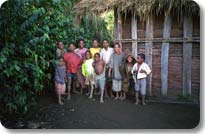 Once
again in the
morning, I found myself surrounded by thirty
whispering people. They followed me around the village, but
it’s ok, I didn’t mind. They followed me to the bathroom,
though at this time they were waved them off. Tolerance ends
at the outhouse. I had another question and answer session
and was asked about the frequent earthquakes they felt and inquired
more about my family. They told me about bride
price. This is a tradition where a man gives gifts and money
to the bride’s family. Typically it consists of 2000-3000
kina, farm tools, traditional gifts of bows and arrows, birds of
paradise feathers, billums (woven bag for carrying goods), and stone
axes. But it also includes pigs, a minimum of five and
sometimes more. You have to provide the pigs lest you insult
the other family. Pigs are status symbols and one needs to be
liberal with the cloven-hoofed goods. I told them in the
U.S., people usually exchange rings. They seemed to think
pigs were a much better idea (and tastier).
Once
again in the
morning, I found myself surrounded by thirty
whispering people. They followed me around the village, but
it’s ok, I didn’t mind. They followed me to the bathroom,
though at this time they were waved them off. Tolerance ends
at the outhouse. I had another question and answer session
and was asked about the frequent earthquakes they felt and inquired
more about my family. They told me about bride
price. This is a tradition where a man gives gifts and money
to the bride’s family. Typically it consists of 2000-3000
kina, farm tools, traditional gifts of bows and arrows, birds of
paradise feathers, billums (woven bag for carrying goods), and stone
axes. But it also includes pigs, a minimum of five and
sometimes more. You have to provide the pigs lest you insult
the other family. Pigs are status symbols and one needs to be
liberal with the cloven-hoofed goods. I told them in the
U.S., people usually exchange rings. They seemed to think
pigs were a much better idea (and tastier).
The men sang a courtship song for me (err…I hope that they were giving
me a cultural demonstration and not actually courting me if you know
what I mean) and they told me about their dating rituals. You
ask a girl’s father if you can date her. If so, you will date
for a month or so and then determine if you want to marry. If
you do, then you raise bride price, usually with family members helping
out and you get married. It’s all pretty cut and
dried. I described dating in the U.S. and how my sister was
seeing a guy for years. First it was on and then off, then
they needed time apart and then they were inseparable, and then they
were…four years later it was finally and firmly determined that…no
wait..she wasn’t so sure anymore. One of the villagers
commented, “She sounds indecisive.” “Bingo! You’ve
got it!” I replied. They all agreed that they prefer their
system of dating. One guy asked if he could marry my
sister. I told him I’d get back to him on that.
The basis of Mengino and in fact the entire backcountry of the region
is agriculture, most of which is subsistence based. Every
single family has land with a farm and pretty much every day they
dedicate part of it to taking care of their crops. There is
some trade in crops with the “outside” world. While this is
limited, it is their primary source of cash income. For
example, Robert spends a lot of time ferrying coffee from the highlands
interior to the coffee exchange in Goroka. There is a system
set up to keep track of how much they sell and how they get
paid. When a person needs to buy a shovel for their garden,
it’s paid for primarily by this trade. There were some
efforts to move the villages into raising vanilla when I was
there. Coffee is a fairly bulky crop, while vanilla is one
that is significantly smaller and less money would be spent on
transporting it but at that time coffee was king (and queen).
They brought me into the gardens to show me how they raised their food.
Several people had tarps in the center of the village covered in coffee
beans drying in the sun. Other crops that are very common are
taro and kaukau (sweet potato). Both of these are very common
in the highlands diet and spend anytime there and you’ll be sure to
have plenty.
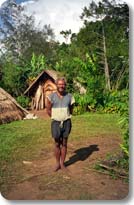 Nimson and I talked
a lot about village life and his role in
it. There had never been a government official in Mengino and
if one came, he would tell them to go away and leave them
alone. They are absolutely, completely indifferent to what
happens in the capital, Port Moresby. The only interaction
they have with the government is they pay some tax on the coffee they
sell. He mentioned that he maintained the village “court
system.” If there was a fight in the village,
Nimson would talk to the people involved and make a decision as to how
to deal with it and it would all be taken care of quite
quickly. There was one fight when I was there that everyone
went running to see, but I felt it best to hold back and keep a
distance. I explained our judicial system of the preliminary
hearings, the pleading of innocence or guilt, the jury trial, the
lawyers, the months of time and expense, the appeals court and the
like. The people shook their heads. Like dating,
they preferred their system of justice.
Nimson and I talked
a lot about village life and his role in
it. There had never been a government official in Mengino and
if one came, he would tell them to go away and leave them
alone. They are absolutely, completely indifferent to what
happens in the capital, Port Moresby. The only interaction
they have with the government is they pay some tax on the coffee they
sell. He mentioned that he maintained the village “court
system.” If there was a fight in the village,
Nimson would talk to the people involved and make a decision as to how
to deal with it and it would all be taken care of quite
quickly. There was one fight when I was there that everyone
went running to see, but I felt it best to hold back and keep a
distance. I explained our judicial system of the preliminary
hearings, the pleading of innocence or guilt, the jury trial, the
lawyers, the months of time and expense, the appeals court and the
like. The people shook their heads. Like dating,
they preferred their system of justice.
Nimson and I spent a long time talking in the afternoon. I
told him of the guy who so enjoyed our conversations and how he laughed
so much. An hour later, the Laughing Man sat down outside the
hut. I said, “That’s the one who laughed so hard.”
He responded, “Him?
That’s my brother, he’s deaf and
dumb!” I can be pretty animated when talking so he must have
been responding to my gestures but either way, it appears that we both
got a lot out of our encounters and that’s good. Maybe there
is some sort of universal language. Nimson discussed some of
the needs of the village, specifically medical needs. He has
medical training and can utilize whatever supplies I could help them
with. He did write down some things he could use and I agreed
to help them. I’m all for trying to help the village as long
as it’s not supplying “gifts” which would only be used by a single
person. During our talks, for some reason I mentioned
McDonalds. Not one single person had any idea what that
was. You know, I’m really liking these people.
Later we went out to watch the “mob”, as Nimson called them, play
rugby. They played on hard ground, which made thudding noises
as bodies hit the earth. They would get up and keep
running. These guys were tough and there is no way you could
have gotten me out there to play as the phrase “scraped off the ground”
would have been appropriate. I look around at the people from
home and see them winded after a flight of stairs whereas these people
are out every day working hard. An eight hour walk to the
next village? No problem, even the older people will do it
all the time. Nimson wandered off and an older woman
approached me and started speaking the local language. She
pulled up her shirt and grabbed her breasts and started pointing them
around at the people gathered round. It was a decidedly
uncomfortable situation. I had no idea what she was saying or
how to react. Do you ignore her or do you respect the elders,
although my urge was to run away screaming. Nobody seemed
alarmed at what was happening, except for me of course, although some
were giggling at my apparent discomfort. She kept going on
and pointing her breasts around, “Help…help” I murmured but the English
speakers were nowhere to be seen. Finally someone came by when he
noticed my discomfort. He said, “She was asking how you could
be away from your family for so long. She was pointing to her
children and saying that she breastfed them all and has never been more
than a day’s walk away from them.” She was pointing her
breasts at her grown children?! We need to accept that others have
different ways, but Mom, if you’re reading this…never do that…ever.
At night, we gathered around the hut fire, talked into the late hours
and had a dinner of taro. One of the older men told me what
it was like when they first saw white people. You know,
that’s the sort of thing you read about but here it was, front and
center. We talked about a wide variety of subjects and I even
gave a brief description of the internet. They are quite
curious about things that are far beyond their horizons but have
limited ability to learn of those things due to their
remoteness. Nimson sees very little change for Mengino in the
years ahead. It’s too isolated and poor. They’re
working on getting people to read, not program computers.
Earlier that day I saw an adult learning to read from a children’s
book, one of the very few books I saw. Nimson said, “We have
people who can teach reading, what we lack is books.”
There really are very few options for them there and I fear that over
time, the isolated villages might start to depopulate as they have in
so many places around the world. There is a certain
timelessness to them but they have to make their own choices and it’s
not up to me what they choose. Nimson did ask about satellite
TV and what it would cost. I went through the expenses of a
dish, monthly subscription, generator and fuel, which is out of their
reach right now. In the corner, people were still playing
cards. One replied, “They can go on for days.”
In the morning, I thought about the TV discussion with Nimson last
night. It’s not up to me to decide what they are going to do
but I thought it best to balance the information they
received. I said, “If you get TV, you need to consider how it
will change your village. Yes, it can bring great
information, but it would mostly be garbage. You have a very
rich social life here with people gathering around the fire and talking
to each other while looking at each other. If you get a TV,
the attention will all be focused on the TV and not each
other. It will affect things socially.” I
emphasized how I wasn’t telling him what to do, but there are changes
that would happen. Nimson said, “I’ll have to think about
it. I never considered these things.”
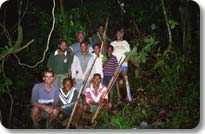 In the
afternoon the
mob decided to bring me into the bush.
They said, “We’ll get our bows and arrows.” I was really
surprised, yep, they got them. I’m a pretty strong hiker but
compared to these guys, I’m a sissy…a big sissy.
Earlier I
told them how men didn’t hold hands in our culture and if a man held my
hand, I would be uncomfortable. We were climbing a hill and I was
slipping on the logs. The mob, in their bare feet, were
racing up. Someone said, “Grab his hand and help him
up.” Nimson said, “NO! It’s against his
culture.” That made me laugh, “Nimson, you can grab my hand
to help me up as long as you let go at the top.” My friend
liked that. The mob’s machetes were flying as they cleared a
path in the fast growing jungle. I have to say, these guy
were strong and could keep doing this all day long.
In the
afternoon the
mob decided to bring me into the bush.
They said, “We’ll get our bows and arrows.” I was really
surprised, yep, they got them. I’m a pretty strong hiker but
compared to these guys, I’m a sissy…a big sissy.
Earlier I
told them how men didn’t hold hands in our culture and if a man held my
hand, I would be uncomfortable. We were climbing a hill and I was
slipping on the logs. The mob, in their bare feet, were
racing up. Someone said, “Grab his hand and help him
up.” Nimson said, “NO! It’s against his
culture.” That made me laugh, “Nimson, you can grab my hand
to help me up as long as you let go at the top.” My friend
liked that. The mob’s machetes were flying as they cleared a
path in the fast growing jungle. I have to say, these guy
were strong and could keep doing this all day long.
They brought me to their birthing cave. When a
woman is about
to give birth, she comes here with a mid-wife. Everyone in the mob had
been born there. In the cave, they showed me how they made
fire with a stick and bark. They split a stick about the
thickness of a finger and put a smaller stick in the split to hold it
open. They cut off a thin piece of bark and quickly rubbed it
back and forth across the split, holding it above dried
leaves. In fifteen seconds, they were blowing on the
smoldering leaves. I was impressed at how quickly they could
do it. I told them how I could make fire with flint and steel
but it wasn’t completely from bush materials. On the walk
home, the mob spotted something to hunt in the distance. They
took chase and zoom! They were gone. Good
heavens are they fast.
That evening we, once again, as is usual in the village, sat around the
fire and talked. Many people were interested in my thoughts
about the end of time, among other subjects. This is a keen
interest of theirs and they tried to relate some of what I told them
was going on in the rest of the world with their beliefs in this
subject. However we were distracted from such deeper subjects
with the arrival of dinner, which consisted of taro (naturally) and a
special treat of corn on the cob. You have to like
that. Nimson asked if he would be able to write me while I
was traveling. I told him that he could send a letter to my
mom, who would take a picture of it and then he interjected, “She’ll
send it to you on the internet?” I think he was starting to
understand.
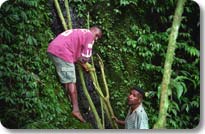
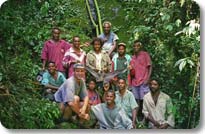 On my last day, we
went to the base of a cliff above Mengino, at the
top of which was cave with bats inside. On the way there,
they found a big, grasshopper-like bug and showed it to me.
They didn’t catch it for showing off, but for food. Nimson
said that he didn’t want to return without bringing something for his
daughter. He killed it and wrapped it in a leaf to bring
home. I have to say, I’m certainly glad they didn’t give it
to me as I don’t think I would have been able to eat it.
Chocolate covered ants, maybe. Big, juicy, crunchy bugs…I
don’t think so. They continued to pick up various bits of
bush food here and there. They do know the land well, that’s
for sure.
On my last day, we
went to the base of a cliff above Mengino, at the
top of which was cave with bats inside. On the way there,
they found a big, grasshopper-like bug and showed it to me.
They didn’t catch it for showing off, but for food. Nimson
said that he didn’t want to return without bringing something for his
daughter. He killed it and wrapped it in a leaf to bring
home. I have to say, I’m certainly glad they didn’t give it
to me as I don’t think I would have been able to eat it.
Chocolate covered ants, maybe. Big, juicy, crunchy bugs…I
don’t think so. They continued to pick up various bits of
bush food here and there. They do know the land well, that’s
for sure.
Once we reached the cliff, they built a ladder twelve meters
tall out
of trees and vines, building it right there on the spot using their
machetes. Some of the mob climbed up with their bows and went
into the cave. Nimson said that he wasn’t going to go up
there because he’s the chief and doesn’t have to and he said I couldn’t
either as I’m the guest (and I suspect he was too worried about me
getting hurt). It’s hard to see as the cave is very dark, but
they managed to get a flying fox, one of the biggest bats in the
world. Nimson told me a traditional tale of bats and I
related our stories of vampires. When told of how
bats echolocate (see in the dark with sound), they were
impressed.
Upon our return one
of the elders dressed up in traditional dress for
me and the children played flutes; yep, they had to show off a little
bit for me, which was nice. Unfortunately this was the last
day in Mengino. The plane was coming tomorrow and I prepared
to leave. I really wished I had allotted more days in the
area. I said goodbye to all and especially to
Nimson. I hoped that one day we would be able to meet
again. Two of Nimson's sons guided me back to
Maimafu. It started to rain and I put on my expensive
synthetic rain jacket. Nimsom’s sons hacked off two-meter
long banana leaves and used them like umbrellas. They sure
did work, were much cheaper, and renewable. Two worlds…two
approaches.
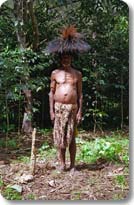 My night in Maimafu was unremarkable and the next day Robert came to
pick me up and made another perfect landing. He said to me,
“We can fly back to Goroka right now or we can fly around for the
afternoon.” “Let’s fly!” I said. So Robert brought
me around to several very isolated villages, dropping goods off and
picking up coffee and other things. One popular item that I
saw on all flights and everywhere in PNG was chicken-flavored Maggi
two-minute noodles. Sad, but true. I tell you, he
brought me places that I never, in a thousand years, thought I would be
able to see.
My night in Maimafu was unremarkable and the next day Robert came to
pick me up and made another perfect landing. He said to me,
“We can fly back to Goroka right now or we can fly around for the
afternoon.” “Let’s fly!” I said. So Robert brought
me around to several very isolated villages, dropping goods off and
picking up coffee and other things. One popular item that I
saw on all flights and everywhere in PNG was chicken-flavored Maggi
two-minute noodles. Sad, but true. I tell you, he
brought me places that I never, in a thousand years, thought I would be
able to see.
Upon return to Goroka, I stayed at a guesthouse and met Burkhardt from
Germany. He liked the sound of Mengino and he ended up
going. Mengino never had an outsider and then they have two
of them. When Burkhardt returned he raved about Mengino and
thanked me for telling him about it. He said, “Everywhere in
Mengino, I could hear people talking in their language, but I would
frequently hear your name among the words. You’re impact is
strongly felt and they won’t forget you.” I replied, “I won’t
forget them either.”
Epilogue:
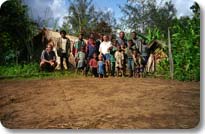 In
Goroka, I tried
to buy medical supplies for the village that Robert
said he would deliver for me, but the banks were closed for several
days. I was able to buy a rugby ball for them.
In
Goroka, I tried
to buy medical supplies for the village that Robert
said he would deliver for me, but the banks were closed for several
days. I was able to buy a rugby ball for them.
A few years later, I made a donation through the Research and
Conservation Foundation which helps villages in the area.
Everyone I talked to agreed they were very good to deal with.
I donated around $300 for medical supplies and coordinated it with the
RCF. We were both very clear about what the donation would be
used for and they would ensure compliance. They wouldn’t give
the money to Mengino; rather they would ask what sort of supplies they
need and would buy them for the people to avoid corruption
issues. A year later, I wanted to make another donation and
the RCF asked me what sort of arrangement I made with Nimson as somehow
Nimson had somehow converted my donations to personal use.
Nimson told the RCF that it was repayment for taking care of me in
Mengino.
I really want to help the people of Mengino but if Nimson is going to
misuse the money, what can I do? It saddens me, but my will
to help seems to have grown distant.

 The
next morning I
woke up to the sun just coming over the mountain.
The air was perfectly still with mist rising off the trees and grasses.
What a perfect start to a day. I talked to a guide about
going around the mountain and he brings me to see the chief.
He immediately starts throwing around large numbers and a single fee
becomes two and three fees. A 14 Kina activity (1 Kina = .4
US$) becomes 70 Kina and it just kept going on and on. The
idea of Crater Mountain was that everything is a fixed price so you
don’t have these hassles. He offered me some food, but
declined not knowing if any strings were attached. It went on
like this the next day and a half. When I took a walk to a
waterfall, the people were great but as soon as the chief got involved,
it became very unpleasant. I couldn’t walk around the
mountain and had to stay put seeing that:
The
next morning I
woke up to the sun just coming over the mountain.
The air was perfectly still with mist rising off the trees and grasses.
What a perfect start to a day. I talked to a guide about
going around the mountain and he brings me to see the chief.
He immediately starts throwing around large numbers and a single fee
becomes two and three fees. A 14 Kina activity (1 Kina = .4
US$) becomes 70 Kina and it just kept going on and on. The
idea of Crater Mountain was that everything is a fixed price so you
don’t have these hassles. He offered me some food, but
declined not knowing if any strings were attached. It went on
like this the next day and a half. When I took a walk to a
waterfall, the people were great but as soon as the chief got involved,
it became very unpleasant. I couldn’t walk around the
mountain and had to stay put seeing that: They
would ask me
questions like, “tell us about New York,” or “What is
Australia like?” They would listen to my every word, every
eye focused on me. Only a few could speak English but there
was one guy who reacted to everything I said. Every funny
word or gesture made him laugh and he was wide-eyed at every
story. But for the most part, Nimson was
translating. A skyscraper was initially described as, “The
cities have buildings made of stone and steel that are 400 meters
tall.” When Nimson translated, he went on and on and pointed
to the mountains nearby. Then I realized that for someone who
lived in houses made entirely from bush materials, he had to put it in
terms they could understand. How do you explain a subway to
someone who has never seen a train? Yet based on their
reactions, somehow Nimson managed to get it across to them.
The nearest road to Mengino is 90 difficult km. away and I was told
that for people deep in the bush, they’ve seen more airplanes than cars.
They
would ask me
questions like, “tell us about New York,” or “What is
Australia like?” They would listen to my every word, every
eye focused on me. Only a few could speak English but there
was one guy who reacted to everything I said. Every funny
word or gesture made him laugh and he was wide-eyed at every
story. But for the most part, Nimson was
translating. A skyscraper was initially described as, “The
cities have buildings made of stone and steel that are 400 meters
tall.” When Nimson translated, he went on and on and pointed
to the mountains nearby. Then I realized that for someone who
lived in houses made entirely from bush materials, he had to put it in
terms they could understand. How do you explain a subway to
someone who has never seen a train? Yet based on their
reactions, somehow Nimson managed to get it across to them.
The nearest road to Mengino is 90 difficult km. away and I was told
that for people deep in the bush, they’ve seen more airplanes than cars. Once
again in the
morning, I found myself surrounded by thirty
whispering people. They followed me around the village, but
it’s ok, I didn’t mind. They followed me to the bathroom,
though at this time they were waved them off. Tolerance ends
at the outhouse. I had another question and answer session
and was asked about the frequent earthquakes they felt and inquired
more about my family. They told me about bride
price. This is a tradition where a man gives gifts and money
to the bride’s family. Typically it consists of 2000-3000
kina, farm tools, traditional gifts of bows and arrows, birds of
paradise feathers, billums (woven bag for carrying goods), and stone
axes. But it also includes pigs, a minimum of five and
sometimes more. You have to provide the pigs lest you insult
the other family. Pigs are status symbols and one needs to be
liberal with the cloven-hoofed goods. I told them in the
U.S., people usually exchange rings. They seemed to think
pigs were a much better idea (and tastier).
Once
again in the
morning, I found myself surrounded by thirty
whispering people. They followed me around the village, but
it’s ok, I didn’t mind. They followed me to the bathroom,
though at this time they were waved them off. Tolerance ends
at the outhouse. I had another question and answer session
and was asked about the frequent earthquakes they felt and inquired
more about my family. They told me about bride
price. This is a tradition where a man gives gifts and money
to the bride’s family. Typically it consists of 2000-3000
kina, farm tools, traditional gifts of bows and arrows, birds of
paradise feathers, billums (woven bag for carrying goods), and stone
axes. But it also includes pigs, a minimum of five and
sometimes more. You have to provide the pigs lest you insult
the other family. Pigs are status symbols and one needs to be
liberal with the cloven-hoofed goods. I told them in the
U.S., people usually exchange rings. They seemed to think
pigs were a much better idea (and tastier). Nimson and I talked
a lot about village life and his role in
it. There had never been a government official in Mengino and
if one came, he would tell them to go away and leave them
alone. They are absolutely, completely indifferent to what
happens in the capital, Port Moresby. The only interaction
they have with the government is they pay some tax on the coffee they
sell. He mentioned that he maintained the village “court
system.” If there was a fight in the village,
Nimson would talk to the people involved and make a decision as to how
to deal with it and it would all be taken care of quite
quickly. There was one fight when I was there that everyone
went running to see, but I felt it best to hold back and keep a
distance. I explained our judicial system of the preliminary
hearings, the pleading of innocence or guilt, the jury trial, the
lawyers, the months of time and expense, the appeals court and the
like. The people shook their heads. Like dating,
they preferred their system of justice.
Nimson and I talked
a lot about village life and his role in
it. There had never been a government official in Mengino and
if one came, he would tell them to go away and leave them
alone. They are absolutely, completely indifferent to what
happens in the capital, Port Moresby. The only interaction
they have with the government is they pay some tax on the coffee they
sell. He mentioned that he maintained the village “court
system.” If there was a fight in the village,
Nimson would talk to the people involved and make a decision as to how
to deal with it and it would all be taken care of quite
quickly. There was one fight when I was there that everyone
went running to see, but I felt it best to hold back and keep a
distance. I explained our judicial system of the preliminary
hearings, the pleading of innocence or guilt, the jury trial, the
lawyers, the months of time and expense, the appeals court and the
like. The people shook their heads. Like dating,
they preferred their system of justice.  In the
afternoon the
mob decided to bring me into the bush.
They said, “We’ll get our bows and arrows.” I was really
surprised, yep, they got them. I’m a pretty strong hiker but
compared to these guys, I’m a sissy…a big sissy.
Earlier I
told them how men didn’t hold hands in our culture and if a man held my
hand, I would be uncomfortable. We were climbing a hill and I was
slipping on the logs. The mob, in their bare feet, were
racing up. Someone said, “Grab his hand and help him
up.” Nimson said, “NO! It’s against his
culture.” That made me laugh, “Nimson, you can grab my hand
to help me up as long as you let go at the top.” My friend
liked that. The mob’s machetes were flying as they cleared a
path in the fast growing jungle. I have to say, these guy
were strong and could keep doing this all day long.
In the
afternoon the
mob decided to bring me into the bush.
They said, “We’ll get our bows and arrows.” I was really
surprised, yep, they got them. I’m a pretty strong hiker but
compared to these guys, I’m a sissy…a big sissy.
Earlier I
told them how men didn’t hold hands in our culture and if a man held my
hand, I would be uncomfortable. We were climbing a hill and I was
slipping on the logs. The mob, in their bare feet, were
racing up. Someone said, “Grab his hand and help him
up.” Nimson said, “NO! It’s against his
culture.” That made me laugh, “Nimson, you can grab my hand
to help me up as long as you let go at the top.” My friend
liked that. The mob’s machetes were flying as they cleared a
path in the fast growing jungle. I have to say, these guy
were strong and could keep doing this all day long.
 On my last day, we
went to the base of a cliff above Mengino, at the
top of which was cave with bats inside. On the way there,
they found a big, grasshopper-like bug and showed it to me.
They didn’t catch it for showing off, but for food. Nimson
said that he didn’t want to return without bringing something for his
daughter. He killed it and wrapped it in a leaf to bring
home. I have to say, I’m certainly glad they didn’t give it
to me as I don’t think I would have been able to eat it.
Chocolate covered ants, maybe. Big, juicy, crunchy bugs…I
don’t think so. They continued to pick up various bits of
bush food here and there. They do know the land well, that’s
for sure.
On my last day, we
went to the base of a cliff above Mengino, at the
top of which was cave with bats inside. On the way there,
they found a big, grasshopper-like bug and showed it to me.
They didn’t catch it for showing off, but for food. Nimson
said that he didn’t want to return without bringing something for his
daughter. He killed it and wrapped it in a leaf to bring
home. I have to say, I’m certainly glad they didn’t give it
to me as I don’t think I would have been able to eat it.
Chocolate covered ants, maybe. Big, juicy, crunchy bugs…I
don’t think so. They continued to pick up various bits of
bush food here and there. They do know the land well, that’s
for sure. My night in Maimafu was unremarkable and the next day Robert came to
pick me up and made another perfect landing. He said to me,
“We can fly back to Goroka right now or we can fly around for the
afternoon.” “Let’s fly!” I said. So Robert brought
me around to several very isolated villages, dropping goods off and
picking up coffee and other things. One popular item that I
saw on all flights and everywhere in PNG was chicken-flavored Maggi
two-minute noodles. Sad, but true. I tell you, he
brought me places that I never, in a thousand years, thought I would be
able to see.
My night in Maimafu was unremarkable and the next day Robert came to
pick me up and made another perfect landing. He said to me,
“We can fly back to Goroka right now or we can fly around for the
afternoon.” “Let’s fly!” I said. So Robert brought
me around to several very isolated villages, dropping goods off and
picking up coffee and other things. One popular item that I
saw on all flights and everywhere in PNG was chicken-flavored Maggi
two-minute noodles. Sad, but true. I tell you, he
brought me places that I never, in a thousand years, thought I would be
able to see. In
Goroka, I tried
to buy medical supplies for the village that Robert
said he would deliver for me, but the banks were closed for several
days. I was able to buy a rugby ball for them.
In
Goroka, I tried
to buy medical supplies for the village that Robert
said he would deliver for me, but the banks were closed for several
days. I was able to buy a rugby ball for them.